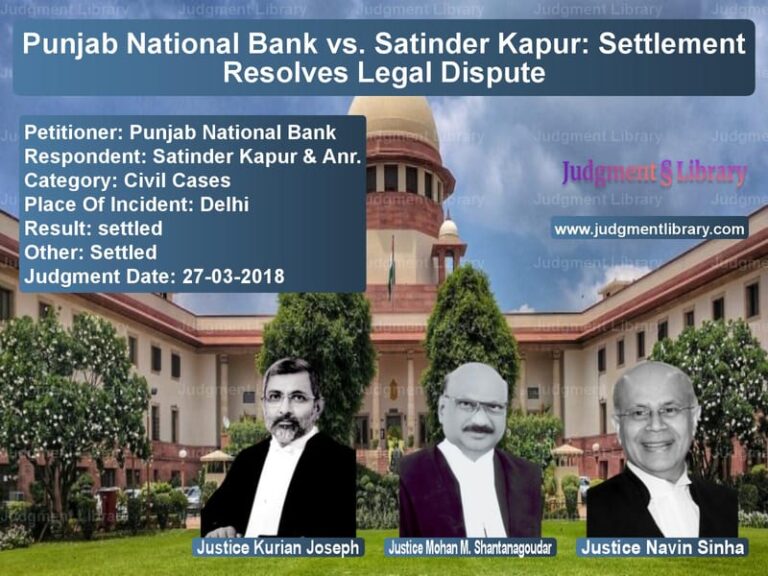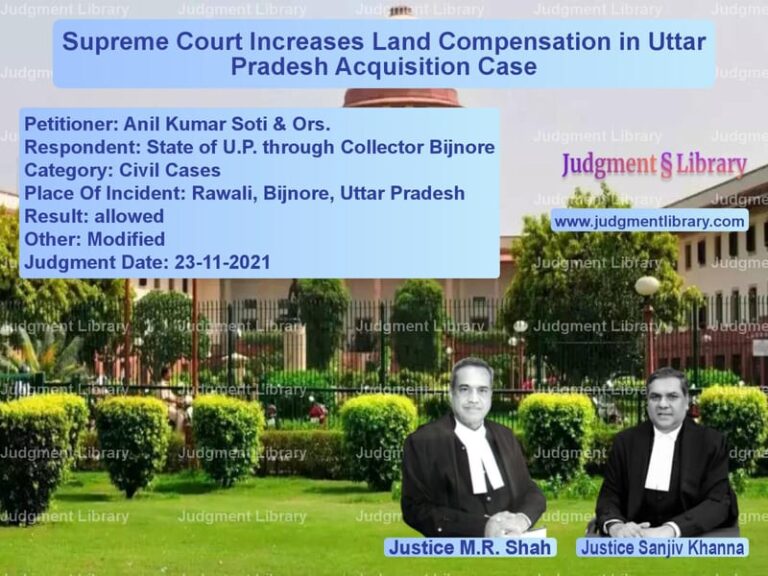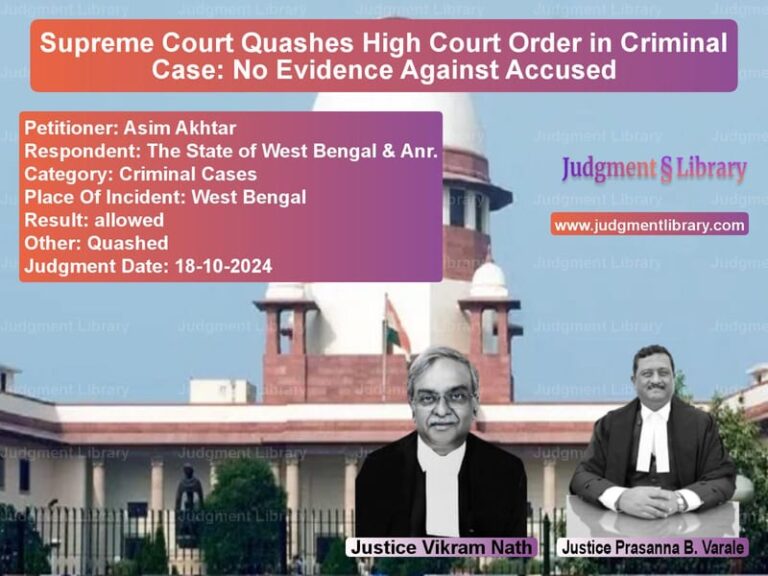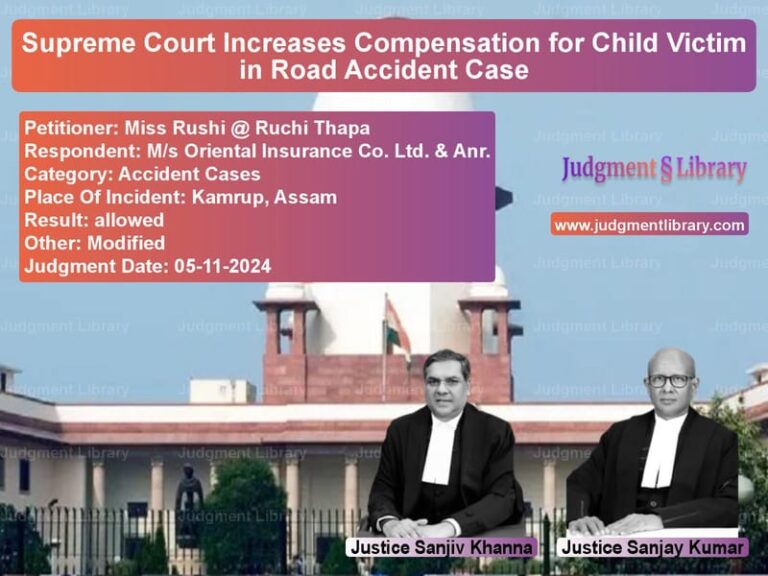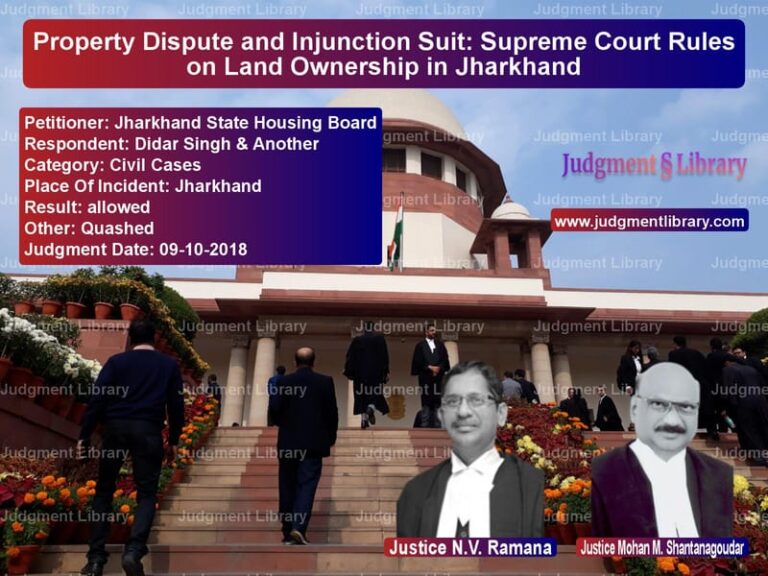Environmental Clearance and Ex-Post Facto Approvals: Supreme Court Ruling on Sweta Estate Pvt. Ltd.
The case of M/s Sweta Estate Pvt. Ltd. Gurgaon vs. Haryana State Pollution Control Board revolves around a crucial issue concerning environmental clearance (EC) and ex-post facto approvals for large-scale construction projects. This judgment by the Supreme Court of India clarifies the legal position on whether retrospective environmental approvals can absolve past violations and the role of regulatory authorities in ensuring compliance with environmental laws.
Background of the Case
The appellant, M/s Sweta Estate Pvt. Ltd., was engaged in developing a housing project in Gurgaon, Haryana. The project involved multiple residential and service apartment towers. The company initially applied for Consent to Establish (CTE) under the Air (Prevention and Control of Pollution) Act, 1981 and the Water (Prevention and Control of Pollution) Act, 1974 in August 2006. Subsequently, on April 10, 2007, the Ministry of Environment, Forest, and Climate Change granted environmental clearance (EC) for the project.
The key legal issue arose when the validity of the EC expired on April 9, 2012. Despite this, construction continued, and the company applied for a fresh EC in 2017. Meanwhile, the Haryana State Pollution Control Board rejected multiple applications for the renewal of the CTE and issued a show cause notice for closure in December 2015. Eventually, in October 2017, the Board granted an ex-post facto CTE to the company but imposed a condition that prosecution for past violations would continue.
Petitioner’s Arguments
The appellant, Sweta Estate Pvt. Ltd., argued:
- The construction was largely completed before April 2012, and no fresh EC was required for minor remaining work.
- The subsequent EC granted in 2017 rectified any irregularities, making prosecution unnecessary.
- The Haryana Pollution Control Board had granted ex-post facto CTE, which should protect them from penal actions.
- The National Green Tribunal (NGT) overstepped its jurisdiction by commenting on the validity of EC beyond the scope of the appeal.
Respondent’s Arguments
The Haryana State Pollution Control Board countered:
- Environmental laws require continuous compliance, and once an EC expires, further construction without renewal is illegal.
- Ex-post facto CTE does not automatically condone past violations.
- The Board had explicitly imposed a condition that prosecution would proceed despite granting ex-post facto CTE.
- The company failed to comply with regulations for five years (2012-2017) and should face legal consequences.
Key Legal Issues Considered
1. Validity of Environmental Clearance
The Supreme Court examined whether the initial EC expired on April 9, 2012, and whether the subsequent approval in 2017 could legitimize construction activities carried out in the interim period.
2. Legality of Ex-Post Facto Approvals
The Court assessed whether an ex-post facto CTE granted in 2017 could absolve Sweta Estate Pvt. Ltd. of liability for construction activities undertaken without a valid EC from 2012-2017.
3. Jurisdiction of the National Green Tribunal
The Court analyzed whether the NGT overstepped its authority by commenting on EC validity when the appeal was limited to the legality of the prosecution order.
Supreme Court’s Verdict
The Supreme Court delivered a nuanced verdict:
- The Court set aside the observations made in paragraph 12 of the NGT’s judgment, which declared the construction from 2012-2017 illegal.
- The Court ruled that ex-post facto approvals do not automatically absolve past violations unless specifically stated by law.
- The Haryana State Pollution Control Board was justified in prosecuting Sweta Estate Pvt. Ltd., as the ex-post facto CTE contained an explicit condition regarding prosecution.
- The appeal was partially allowed: while the company’s arguments against the NGT’s overreach were accepted, the prosecution for past violations was upheld.
Key Takeaways from the Judgment
- Environmental Compliance is Continuous: Expired ECs must be renewed before further construction can proceed.
- Ex-Post Facto Approvals are Not a Shield: Regulatory bodies can impose penalties even if retrospective approvals are granted.
- Regulatory Decisions Must Be Challenged Promptly: Sweta Estate Pvt. Ltd. should have contested the prosecution condition in the ex-post facto CTE when it was issued.
- Jurisdictional Limits on the NGT: The tribunal should not expand its scope beyond the specific appeal presented before it.
This ruling reinforces the importance of strict environmental compliance and ensures that ex-post facto approvals do not provide immunity for past violations.
Petitioner Name: M/s Sweta Estate Pvt. Ltd. Gurgaon.Respondent Name: Haryana State Pollution Control Board.Judgment By: Justice Abhay S. Oka, Justice Sanjay Karol.Place Of Incident: Gurgaon, Haryana.Judgment Date: 10-11-2023.
Don’t miss out on the full details! Download the complete judgment in PDF format below and gain valuable insights instantly!
Download Judgment: ms-sweta-estate-pvt-vs-haryana-state-pollut-supreme-court-of-india-judgment-dated-10-11-2023.pdf
Directly Download Judgment: Directly download this Judgment
See all petitions in Environmental Cases
See all petitions in Judgment by Abhay S. Oka
See all petitions in Judgment by Sanjay Karol
See all petitions in partially allowed
See all petitions in Modified
See all petitions in supreme court of India judgments November 2023
See all petitions in 2023 judgments
See all posts in Environmental Cases Category
See all allowed petitions in Environmental Cases Category
See all Dismissed petitions in Environmental Cases Category
See all partially allowed petitions in Environmental Cases Category


